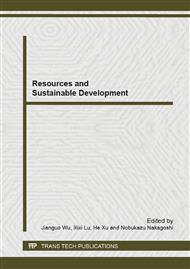p.2021
p.2031
p.2035
p.2041
p.2047
p.2053
p.2059
p.2065
p.2069
Algorithm and Simulation of Chinese Traditional Industrial Clusters Low Carbon Evolution Based on Evolutionary Games Theory on Complex Networks
Abstract:
Industrial clusters are complex networks formed by numerous agents who continuously imitate, learn from each other and make optimal choice accordingly. The paper uses random learning game and multi-agent system models to construct a Chinese traditional industrial clusters low carbon evolution model and introduce an algorithm based on the network external effect and characteristics of agents adaptive behavior. Then the simulation of low-carbon competition, emergence and evolution was conducted, which produced some valuable conclusions.
Info:
Periodical:
Pages:
2047-2052
Citation:
Online since:
August 2013
Authors:
Price:
Сopyright:
© 2013 Trans Tech Publications Ltd. All Rights Reserved
Share:
Citation:


